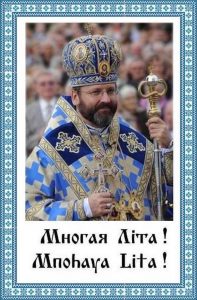 The Resurrection and the Ascension are two separate concepts. This was known by the Gospel writers, particularly St. Luke. St. John also distinguishes the two, when Mary Magdalene meets the Risen Lord. Jesus says to her, “Stop holding [traditional: “do not cling to me”] on to me, for I have not yet ascended to the Father” (John 20:17). The Resurrection is the restoration to life of his human body, the Ascension is the glorification of Jesus, both God and man, at the right hand of the Father: “… the angels marveled at the sight of a human being more exalted than themselves. Today, the Father receives again in his bosom the one who was in him from eternity” (First sticheron at Psalm 140, Feast of Ascension).
The Resurrection and the Ascension are two separate concepts. This was known by the Gospel writers, particularly St. Luke. St. John also distinguishes the two, when Mary Magdalene meets the Risen Lord. Jesus says to her, “Stop holding [traditional: “do not cling to me”] on to me, for I have not yet ascended to the Father” (John 20:17). The Resurrection is the restoration to life of his human body, the Ascension is the glorification of Jesus, both God and man, at the right hand of the Father: “… the angels marveled at the sight of a human being more exalted than themselves. Today, the Father receives again in his bosom the one who was in him from eternity” (First sticheron at Psalm 140, Feast of Ascension).
The Ascension is the completion of the Paschal Mystery, the descent in humility, the exaltation again into glory. This serves as the model for every human life. It was necessary that in Christ the full glorification of the human nature be already fulfilled. Jesus did not continue to live among us in a historical sense, for our sanctification lies in accepting the Paschal Mystery of death and resurrection in faith, as our Lord told Thomas, “Blessed are those who have not seen and have believed. (John 20:29)” This, again, is the divine oikonomia. [Paraclete comes]. Jesus is already “King of kings and Lord of lords” (1 Timothy 6:15; Revelation 17:14, 19:16), and reigns at the right hand of the Father.
St. Athanasius gives the fundamental Christian interpretation of the Ascension, “Since, then, the Word was an image of God and was immortal, he assumed the form of a slave and underwent death in our behalf as a man in his own flesh, so that through this death he might, on our account, bring himself home to the Father. For this reason he is also said as a man to have been exalted on our account, and for our sake, so that, just as by his death we have all died in Christ, so conversely in Christ we may be exalted, roused from the dead and going up to the heavens, ‘where Christ entered as our forerunner’ (Hebrews 6:20); Against the Arians 1:37-43 in ACD (Ancient Christian Doctrine) 3, 163).
Meditation by Archpriest David Petras
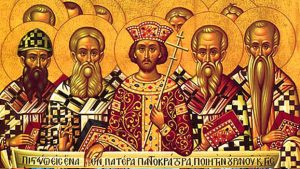 “Holy Father, keep them in your name that you have given me, so that they may be one just as we are” (John 17:11).
“Holy Father, keep them in your name that you have given me, so that they may be one just as we are” (John 17:11).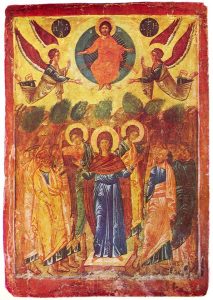 The ascension of our Lord into glory is the seal on his resurrection. Jesus taught Nicodemus, “No one has gone up to heaven except the one who has come down from heaven, the Son of Man” (John 3:13). St. Paul further explains that the ascension is the sign of his victory over the Hades, the kingdom of death, “What does ‘he ascended’ mean except that he also descended into the lower regions of the earth? The one who descended is also the one who ascended far above all the heavens, that he might fill all things” (Ephesians 4:9-10).
The ascension of our Lord into glory is the seal on his resurrection. Jesus taught Nicodemus, “No one has gone up to heaven except the one who has come down from heaven, the Son of Man” (John 3:13). St. Paul further explains that the ascension is the sign of his victory over the Hades, the kingdom of death, “What does ‘he ascended’ mean except that he also descended into the lower regions of the earth? The one who descended is also the one who ascended far above all the heavens, that he might fill all things” (Ephesians 4:9-10).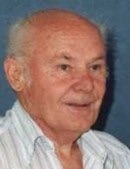 Peter Struk, 94, of North Haven, passed away peacefully on Thursday, May 3, 2018 at the MidState Medical Center, Meriden with his family by his side. He was the beloved husband of 70 years to Melanie Horn Struk. Peter was born on June 3, 1923 in Brzezany, Village of Litiatyn, Region of Galizien, Ukraine and was the son of the late Jacob and Chyma Slywka Struk. Peter was a member of the Carpenters Union Local #79, and worked as an installation technician for Atlantic Floor Covering in New Haven until his retirement. He was an avid gardener and a member of St. Michael’s Ukrainian Church for many years. Father of Peter H. (Victoria) Struk and the late Anna E. Struk. Grandfather of Peter A. and Sarah Struk.
Peter Struk, 94, of North Haven, passed away peacefully on Thursday, May 3, 2018 at the MidState Medical Center, Meriden with his family by his side. He was the beloved husband of 70 years to Melanie Horn Struk. Peter was born on June 3, 1923 in Brzezany, Village of Litiatyn, Region of Galizien, Ukraine and was the son of the late Jacob and Chyma Slywka Struk. Peter was a member of the Carpenters Union Local #79, and worked as an installation technician for Atlantic Floor Covering in New Haven until his retirement. He was an avid gardener and a member of St. Michael’s Ukrainian Church for many years. Father of Peter H. (Victoria) Struk and the late Anna E. Struk. Grandfather of Peter A. and Sarah Struk.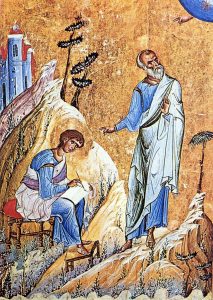 [Today] On May 8, we celebrate one of the two feasts of the Holy Apostle and Evangelist John, the brother of James. The other is on September 26, the day of his falling asleep. The fourth Gospel is attributed to John, and we can truly call it a “theo-logical,” for it witnesses most clearly to the mystery of the Incarnation, of the Word of God taking flesh in the womb of the Holy Theotokos for our salvation. It is the most sublime Gospel, and it gave John the title “Theologian.”
[Today] On May 8, we celebrate one of the two feasts of the Holy Apostle and Evangelist John, the brother of James. The other is on September 26, the day of his falling asleep. The fourth Gospel is attributed to John, and we can truly call it a “theo-logical,” for it witnesses most clearly to the mystery of the Incarnation, of the Word of God taking flesh in the womb of the Holy Theotokos for our salvation. It is the most sublime Gospel, and it gave John the title “Theologian.”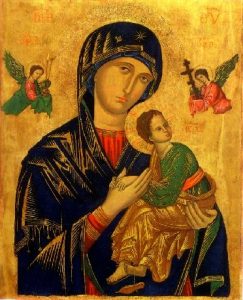 During the month of May our Ukrainian Greek Catholic Church honors the Mary the Mother of God in special prayer services as the akathist and moleben services. Mary was the humble servant of the Lord Who was always one with Her Son, our Lord God and Savior, Jesus Christ.
During the month of May our Ukrainian Greek Catholic Church honors the Mary the Mother of God in special prayer services as the akathist and moleben services. Mary was the humble servant of the Lord Who was always one with Her Son, our Lord God and Savior, Jesus Christ.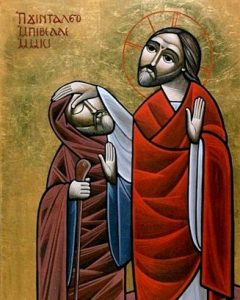 The story of the Man Born Blind is the third Sunday Gospel in Pascha about the mystery of baptism. This gospel is very clear, “Jesus spat on the ground and made clay with the saliva, and smeared the clay on his the blind man’s) eyes, and said to him, “Go wash in the Pool of Siloam” (which means Sent). So he went and washed, and came back able to see” (John 9:6-7). The clay represents the anointing we receive at baptism, making us “Anointed Ones,” (Christs, or Christians) and the washing represents the washing in the water of baptism. The blind man can then see, he is “enlightened,” the name the Church gives to baptism. Two observations: to be truly enlightened, we need humility.
The story of the Man Born Blind is the third Sunday Gospel in Pascha about the mystery of baptism. This gospel is very clear, “Jesus spat on the ground and made clay with the saliva, and smeared the clay on his the blind man’s) eyes, and said to him, “Go wash in the Pool of Siloam” (which means Sent). So he went and washed, and came back able to see” (John 9:6-7). The clay represents the anointing we receive at baptism, making us “Anointed Ones,” (Christs, or Christians) and the washing represents the washing in the water of baptism. The blind man can then see, he is “enlightened,” the name the Church gives to baptism. Two observations: to be truly enlightened, we need humility.